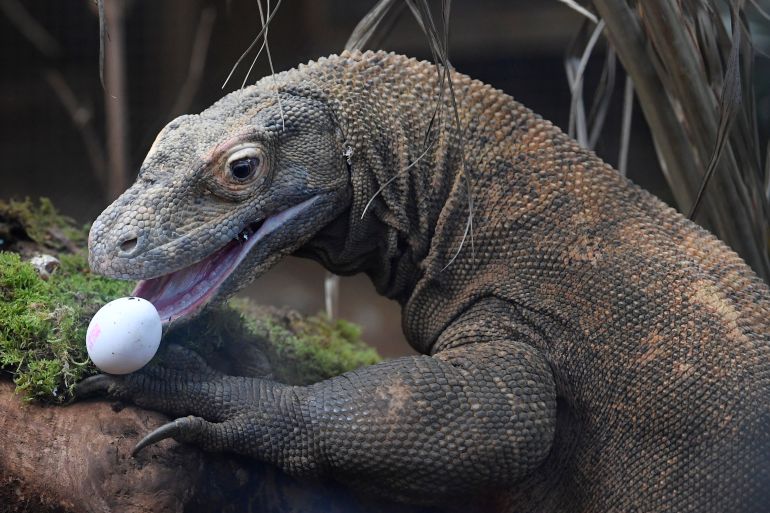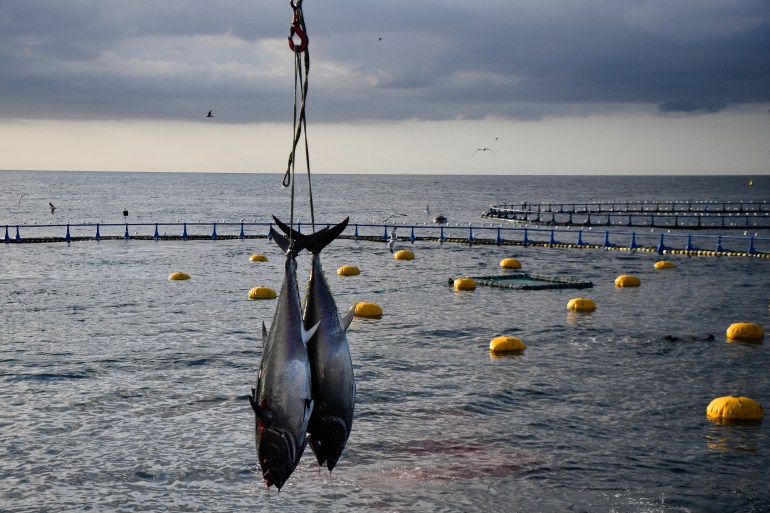IUCN Red List: Bad news for sharks, Komodo dragon; tuna improving
Climate change, loss of habitat and overfishing damage marine life around the world, the International Union for Conservation of Nature warns.

Nearly two in five sharks are threatened with extinction due to overfishing, the International Union for Conservation of Nature (IUCN) has warned in an update of the wildlife Red List that also listed Indonesia’s Komodo dragons – the world’s largest living lizards – as “endangered”.
Overall, about 28 percent of the 138,000 species assessed by the global conservation body for its survival watchlist are now at risk of vanishing in the wild forever, as the destructive effect of human activity on the natural world deepens.
Keep reading
list of 4 itemsHong Kong’s first monkey virus case – what do we know about the B virus?
Indonesia hunts for ‘extinct’ Javan tiger
In Colombia, hunting poachers, not drug traffickers
Habitat loss, overexploitation and illegal trade have hammered global wildlife populations for decades, and climate change is now kicking in as a direct threat as well, the IUCN reported on Saturday.
But the latest update of the Red List for Threatened Species also highlights the potential for restoration, with four commercially fished tuna species pulling back from a slide towards extinction after a decade of efforts to curb overexploitation.
The most spectacular recovery was seen in the Atlantic bluefin tuna, which leapt from “endangered” across three categories to the safe zone of “least concern”. The species – a mainstay of high-end sushi in Japan – was last assessed in 2011.
The southern bluefin also improved from “critically endangered” to “endangered” while albacore and yellowfin tuna were classified as “least concern”.
Calling it “great news”, Craig Hilton-Taylor, head of the IUCN Red List unit told Al Jazeera the “remarkable recovery” was thanks to continuing efforts to enforce fishing quotas over the past two decades.
“It shows that conservation does work and can benefit species,” he said from the French city of Marseilles, which is hosting the IUCN Congress.

A key message from the event is that disappearing species and the destruction of ecosystems are no less existential threats than global warming.
At the same time, climate change itself is casting a darker shadow than ever before on the futures of many species, particularly endemic animals and plants that live uniquely on small islands or in certain biodiversity hotspots.
Komodo dragons are found only in the World Heritage-listed Komodo National Park and neighbouring Flores.
The species “is increasingly threatened by the impacts of climate change” said the IUCN, noting that sea levels are expected to shrink its tiny habitat at least 30 percent over the next 45 years.
Outside of protected areas, the fearsome throwbacks are also rapidly losing ground as humanity’s footprint expands.
“The idea that these prehistoric animals have moved one step closer to extinction due in part to climate change is terrifying,” said Andrew Terry, conservation director at the Zoological Society of London.
Their decline is a “clarion call for nature to be placed at the heart of all decision making” at crunch UN climate talks in Glasgow, he added.
The most comprehensive survey of sharks and rays ever undertaken, meanwhile, revealed that 37 percent of 1,200 species evaluated are now classified as directly threatened with extinction, falling into one of three categories: “vulnerable”, “endangered”, or “critically endangered”.
That is a third more species at risk than only seven years ago, said Simon Fraser University Professor Nicholas Dulvy, lead author of a study published on Monday underpinning the Red List assessment.
“The conservation status of the group as a whole continues to deteriorate, and overall risk of extinction is rising at an alarming rate,” he told AFP news agency.
Five species of sawfish – whose serrated snouts get tangled in cast-off fishing gear – and the iconic shortfin mako shark are among those most threatened.
The Food and Agriculture Organization reports some 800,000 tonnes of sharks are caught – intentionally or opportunistically – each year, but research suggests the true figure is two to four times greater.
Hilton-Taylor told Al Jazeera that “a lot more effort needs to go into stopping and limiting shark catchers around the world”.
“Also, we need to look at the markets and who is consuming shark products and how do we change social attitudes around the consumption of shark products,” he said.